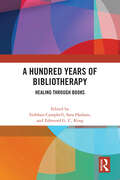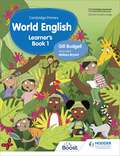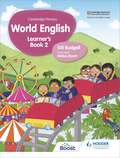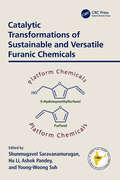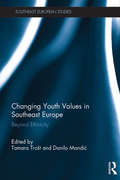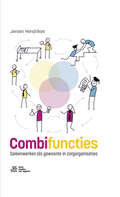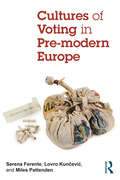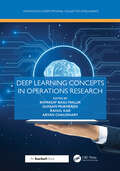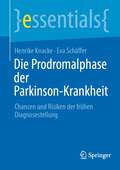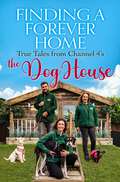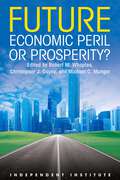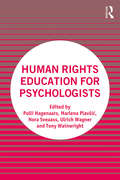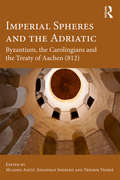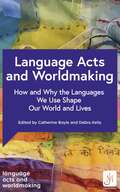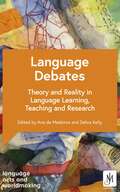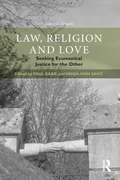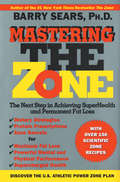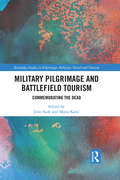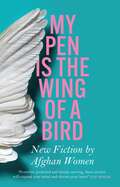- Table View
- List View
A Hundred Years of Bibliotherapy: Healing through Books
byThe First World War gave new and vital impetus to the ancient idea that books could heal. This interdisciplinary collection provides a targeted survey of 100 years of historical and contemporary understandings and practices of ‘the book as cure’.The contributors explore the curative practices of wartime reading, how they were developed and institutionalized after the war, and the afterlives of these ideas and practices today. Divided into three sections, the first considers bibliotherapy in World War I.’ It is rooted in the wartime cultures which ensured bibliotherapy became part of the active treatment of soldiers’ damaged minds and bodies on both sides of the Atlantic after 1914. Parts two and three examine the expanding variety of critical contexts, both historical and more modern, in which reading and wellbeing continued to intersect. The chapters draw on a wide range of source material from trench magazines to autograph books to e-novels, as well as on data and information drawn from practice-based encounters. They also provide the basis for further scholarly exploration of, for example, national traditions and contexts and the inter-disciplinary relationships which they inspire.A Hundred Years of Bibliotherapy: Healing through Books provides the first interdisciplinary dialogue on and account of bibliotherapy, addressing both historical and present-day modes of engaging with the ostensibly curative power of reading and reading cultures. It is an invaluable resource for scholars of literary studies, book history, and the medical humanities.
Cambridge Primary World English Learner's Book Stage 4 (Hodder Cambridge Primary English as a Second Language)
by Gill BudgellThis title has been endorsed by Cambridge Assessment International Education Engage and inspire learners with an international and interconnected approach developed by experienced teachers and language specialists. The series offers full coverage of the learning objectives for the Cambridge Primary English as a Second language curriculum framework (0057) and is mapped to the Common European Framework of Reference. - Stimulate learners with model texts and activities. - Clearly address the key objectives: reading, writing, speaking, listening and use of English.- Support activities and knowledge covered in the Learner's Book with the accompanying Workbook and Teacher's Guide with Boost subscription.- Audio files are available free at https://www.hoddereducation.co.uk/cambridgeextras
Cambridge Primary World English Learner's Book Stage 2 (Hodder Cambridge Primary English as a Second Language)
by Gill BudgellThis title has been endorsed by Cambridge Assessment International EducationEngage and inspire learners with an international and interconnected approach developed by experienced teachers and language specialists. The series offers full coverage of the learning objectives for the Cambridge Primary English as a Second language curriculum framework (0057) and is mapped to the Common European Framework of Reference.- Stimulate learners with model texts and activities.- Clearly address the key objectives: reading, writing, speaking, listening and use of English.- Support activities and knowledge covered in the Learner's Book with the accompanying Workbook and Teacher's Guide with Boost subscription.- Audio files are available free at https://www.hoddereducation.co.uk/cambridgeextras
Cambridge Primary World English Learner's Book Stage 5 (Hodder Cambridge Primary English as a Second Language)
by Gill BudgellThis title has been endorsed by Cambridge Assessment International Education Engage and inspire learners with an international and interconnected approach developed by experienced teachers and language specialists. The series offers full coverage of the learning objectives for the Cambridge Primary English as a Second language curriculum framework (0057) and is mapped to the Common European Framework of Reference. - Stimulate learners with model texts and activities. - Clearly address the key objectives: reading, writing, speaking, listening and use of English.- Support activities and knowledge covered in the Learner's Book with the accompanying Workbook and Teacher's Guide with Boost subscription.- Audio files are available free at https://www.hoddereducation.co.uk/cambridgeextras
Catalytic Transformations of Sustainable and Versatile Furanic Chemicals
byDiminishing confined fossil resources has spurred the scientific community to strive for alternative, sustainable resources, such as terrestrial biomass, which can potentially substitute fossil-based derivatives. Lignocellulosic biomass is deemed an indispensable carbon source for meeting industrial and social demands regarding energy/fuels and chemicals. Over the past decade, significant advances have been shown in developing a broad spectrum of high-value chemicals and functional materials derived from biomass-based substrates. In connection with this, furanic chemicals, such as 5-hydroxymethylfurfural (HMF) and furfural, have recently received considerable attention due to their potential applications. Catalytic Transformations of Sustainable and Versatile Furanic Chemicals aims to explicitly display the latest technical developments on designing functional catalysts, optimizing process and reaction parameters, and improving the stability of the employed materials on the transformation of HMF and furfural to a wide range of value-added chemicals via oxidation, reduction, hydrodeoxygenation, and reductive amination processes.Features: Highlighting the importance and significance of HMF and furfural. Evaluating the transformations of HMF and furfural with various catalytic processes. Designing robust and efficient catalytic systems. Understanding the stability of catalytic materials. Understanding the characteristic features of the catalytic materials. This book aims to target not only researchers focusing on biomass valorization from academic to industrial sectors but also graduate students interested in pursuing their higher education in biochemicals (especially furanic compounds), covering various aspects in organic synthesis routes, preparation of inorganic materials and physico-chemical properties, for both chemists and chemical engineers.
Changing Youth Values in Southeast Europe: Beyond Ethnicity (Southeast European Studies)
by Tamara P. Trost Danilo Mandi 263What shapes the cultural, political and ideological values of young people living in Southeastern Europe? Which identities matter to them? How are their values changing, and how can they be changed? Who is changing them? Europe’s periphery is the testing ground for the success of European values and identities. The future stability and political coherence of the Union will be determined in large measure by identity issues in this region. This book examines the ways in which ethnic and national values and identities have been surpassed as the overriding focus in the lives of the region’s youth. Employing bottom-up, ethnographic, and interview-based approaches, it explores when and where ethnic and national identification processes become salient. Using intra-national and international comparisons of youth populations of Albania, Bosnia-Herzegovina, Croatia, Macedonia, Montenegro, and Serbia, contributors uncover the mechanisms by which ethnic identities are evoked, reproduced and challenged. In addition to exploring political, regional cultural generational and class identities, the contributors examine wider questions of European unity. This volume offers a corrective to previous thinking about youth ethnic identities and will prove useful to scholars in political science and sociology studying issues of ethnic and national identities and nationalism, as well as youth cultures and identities.
Combifuncties: Samenwerken als gewoonte in zorgorganisaties
byDe zorg heeft te maken met een fundamenteel personeelstekort. Een uitdaging waar Combifuncties een bewezen oplossing voor biedt. Maak gebruik van de kracht van combifuncties voor meer motivatie en werkplezier!In een combifunctie bekleedt een medewerker twee verschillende functies in twee teams, afdelingen of zelfs organisaties. Bijvoorbeeld een leidinggevende die ook patiëntenzorg verleent of een verpleegkundige die ook kwaliteitsmedewerker is.In dit boek laat Jeroen Hendrikse zien hoe je krachtige zorgorganisaties krijgt waarin zowel de patiënt als de medewerker zich gehoord, gezien en gesteund voelt. Hij biedt handvatten om aan de slag te gaan en geeft veel voorbeelden uit de zorgpraktijk.---“De aankomende jaren zal het blijven borgen van toegankelijke zorg onze grootste opgave zijn. Jeroen Hendrikse diept in zijn nieuwe boek een belangrijke oplossing uit: de synergie van combifuncties.”Prof. dr. Maurice van den Bosch, interventieradioloog; voorzitter raad van bestuur, Onze Lieve Vrouwe Gasthuis (OLVG); voorzitter, Santeon ---“Dit boek komt precies op tijd! We staan immers op een kruispunt in de zorg. Jeroen Hendrikse brengt vanuit zijn ervaring in de zorg en het leidinggevende kader een verhelderend en inspirerend perspectief op combifuncties. Niet alleen meeslepend en beeldend, maar ook praktisch ingestoken met een goed ontwikkeld stappenplan.”Prof. dr. Jim van Os, hoogleraar psychiatrie; voorzitter Divisie Hersenen, UMC Utrecht---“Combifuncties maken voor veel professionals de zorg weer de leukste plek om te werken.”Prof. dr. Marieke Schuurmans, hoogleraar verplegingswetenschap; Chief Healthcare Organization, Nederlandse Zorgautoriteit (NZa)
Cultures of Voting in Pre-modern Europe
by Miles Pattenden Evi 263 Serena. Ferente Lovro Kun 269Cultures of Voting in Pre-modern Europe examines the norms and practices of collective decision-making across pre-modern European history, east and west, and their influence in shaping both intra- and inter-communal relationships. Bringing together the work of twenty specialist contributors, this volume offers a unique range of case studies from Ancient Greece to the eighteenth century, and explores voting in a range of different contexts with analysis that encompasses constitutional and ecclesiastical history, social and cultural history, the history of material culture and of political thought. Together the case-studies illustrate the influence of ancient models and ideas of voting on medieval and early modern collectivities and document the cultural and conceptual exchange between different spheres in which voting took place. Above all, they foreground voting as a crucial element of Europe’s common political heritage and raise questions about the contribution of pre-modern cultures of voting to modern political and institutional developments. Offering a wide chronological and geographical scope, Cultures of Voting in Pre-modern Europe is aimed at scholars and students of the history of voting and is a fascinating contribution to the key debates that surround voting today.
Deep Learning Concepts in Operations Research (Advances in Computational Collective Intelligence)
by , Biswadip Basu MallikGunjan MukherjeeRahul KarAryan ChaudharyThe model-based approach for carrying out classification and identification of tasks has led to the pervading progress of the machine learning paradigm in diversified fields of technology. Deep Learning Concepts in Operations Research looks at the concepts that are the foundation of this model-based approach. Apart from the classification process, the machine learning (ML) model has become effective enough to predict future trends of any sort of phenomena. Such fields as object classification, speech recognition, and face detection have sought extensive application of artificial intelligence (AI) and ML as well. Among a variety of topics, the book examines: An overview of applications and computing devices Deep learning impacts in the field of AI Deep learning as state-of-the-art approach to AI Exploring deep learning architecture for cutting-edge AI solutions Operations research is the branch of mathematics for performing many operational tasks in other allied domains, and the book explains how the implementation of automated strategies in optimization and parameter selection can be carried out by AI and ML. Operations research has many beneficial aspects for decision making. Discussing how a proper decision depends on several factors, the book examines how AI and ML can be used to model equations and define constraints to solve problems and discover proper and valid solutions more easily. It also looks at how automation plays a significant role in minimizing human labor and thereby minimizes overall time and cost.
Die Prodromalphase der Parkinson-Krankheit: Chancen und Risiken der frühen Diagnosestellung (essentials)
by Eva SchäfferDieses essential klärt darüber auf, wie von der Parkinson-Krankheit Betroffene bereits vor der klinischen Diagnose, in der Prodromalphase, identifiziert werden können und welche ethischen Aspekte dabei zu beachten sind. Bereits vor Manifestation der typischen motorischen Kardinalsymptome breitet sich die α-Synucleinopathie schon einige Jahre im Körper aus und eine Reihe von Symptomen kann auftreten, insbesondere die isolierte REM-Schlaf-Verhaltensstörung. Das Buch für Neurologen in Weiterbildung, Klinik und Praxis beschreibt die jüngsten Fortschritte insbesondere auf dem Gebiet der Biomarker und zeigt die besondere Relevanz eines frühzeitigen individuellen symptomatischen Therapieangebots sowie die Bedeutung präventiver nicht-medikamentöser Maßnahmen auf.
Finding a Forever Home: True Tales from Channel 4's The Dog House
by'The TV series of the decade stars a bunch of rescue dogs' Caitlin MoranSometimes it's love at first sight. Sometimes it takes a while. But the staff at Woodgreen are always there to look after their canine guests until they find the right permanent home. From big to small and pedigree to the scruffiest pooch, no effort is spared to find each and every one a new family who will give them the love they deserve.Rehoming a dog is a big commitment, but also a privilege and a huge joy when the right match is made. Finding a Forever Home introduces Rocky, a gentle giant of a Newfoundland who helped a young boy recover his appetite for food and for life; feisty wee Westie Norman who made a bereaved mother and her autistic son a complete family again, and Pebbles who helped former Paralympian David - on a downward spiral after appendicitis forced him to pull out of the 2012 London Games - and enabled him to calm down, lighten up and to finally find joy in life with his new canine friend. These are just some of the heart-warming and inspiring stories of once-lost dogs, their new families and their journeys beyond The Dog House.Praise for The Dog House series 2: 'This was a charming series when it first appeared a couple of years ago, and it has only grown more lovely' Guardian 'An hour spent watching families meet their new pets cannot fail to lift the mood.' Daily Mail 'The most heartwarming show on TV' Daily Telegraph
Finding a Forever Home: True Tales from Channel 4's The Dog House
by'The TV series of the decade stars a bunch of rescue dogs' Caitlin Moran'Channel 4 series The Dog House has captured hearts across the nation. Now, a touching book Finding a Forever Home goes behind the scenes to meet incredible rescuers and their equally incredible four-legged friends' Daily Express'It "mutt" be love! Adopting a rescue pup is life-changing, as a book about hit show The Dog House proves' The PeopleSometimes it's love at first sight. Sometimes it takes a while. But the staff at Woodgreen are always there to look after their canine guests until they find the right permanent home. From big to small and pedigree to the scruffiest pooch, no effort is spared to find each and every one a new family who will give them the love they deserve.Rehoming a dog is a big commitment, but also a privilege and a huge joy when the right match is made. Finding a Forever Home introduces Rocky, a gentle giant of a Newfoundland who helped a young boy recover his appetite for food and for life; feisty wee Westie Norman who made a bereaved mother and her autistic son a complete family again, and Pebbles who helped former Paralympian David - on a downward spiral after appendicitis forced him to pull out of the 2012 London Games - and enabled him to calm down, lighten up and to finally find joy in life with his new canine friend. These are just some of the heart-warming and inspiring stories of once-lost dogs, their new families and their journeys beyond The Dog House.Praise for The Dog House series 2: 'This was a charming series when it first appeared a couple of years ago, and it has only grown more lovely' Guardian 'An hour spent watching families meet their new pets cannot fail to lift the mood.' Daily Mail 'The most heartwarming show on TV' Daily Telegraph
Future: Economic Peril or Prosperity?
byWhat will the economy look like in fifty years? How will our lives as consumers and workers be transformed by the coming innovations in technology, the marketplace, and the workplace? How will changes in demographics and dependency affect our political system? Will economic freedom rise or fall? What, if anything, would greater prosperity do for one&’s total well-being?Future: Economic Peril or Prosperity? poses these and related questions to a diverse group of economists whose predictions will inspire thoughtful consideration and debate. As co-editor Robert M. Whaples writes in the introductory chapter, &“The predicted changes range from innocent innovations that will make life a bit more comfortable...to potentially chilling technologies that might strip our human dignity.&” Just as important as the book&’s predictions are its insights into how we should think about an uncertain future. As humorist and social critic P. J. O&’Rourke shows in his erudite chapter on self-fulfilling prophecies, wildly wrong predictions are not limited to the likes of a Nostradamous or a Karl Marx: even a Nobel laureate economist running a billion-dollar hedge fund can lose the farm (and other people&’s money) through an overly confident misreading of the economic tea leaves. And yet, perhaps only by delving more deeply into long-term forecasting, and reflecting on past mistakes, can we minimize the hubris that so often clouds the judgments of prognosticators in academia, business, and—perhaps especially—government. Informative, contentious, and at times inspirational, Future: Economic Peril or Prosperity? is an invaluable aid for anyone who understands the need to prepare for the future, even if that future cannot be fully anticipated.
Human Rights Education for Psychologists
by Ulrich Wagner Polli Hagenaars Nora Sveaass Tony Wainwright Marlena Plavsi 263This ground-breaking book is designed to raise awareness of human rights implications in psychology, and provide knowledge and tools enabling psychologists to put a human rights perspective into practice. Psychologists have always been deeply engaged in alleviating the harmful consequences human rights violations have on individuals. However, despite the fundamental role that human rights play for professional psychology and psychologists, human rights education is underdeveloped in psychologists’ academic and vocational training. This book, the first of its kind, looks to change this, by: raising awareness among professional psychologists, university teachers and psychology students about their role as human rights promoters and protectors providing knowledge and tools enabling them to put a human rights perspective into practice providing texts and methods for teaching human rights. Featuring chapters from leading scholars in the field, spanning 18 countries and six continents, the book identifies how psychologists can ensure they are practising in a responsible way, as well as contributing to wider society with a clear knowledge of human rights issues in relation to culture, gender, organisations and more. Including hands-on recommendations, case studies and discussion points, this is essential reading for professional psychologists as part of continuing professional development and those in training and taking psychology courses.
Imperial Spheres and the Adriatic: Byzantium, the Carolingians and the Treaty of Aachen (812)
by Jonathan Shepard I 263 Trpimir Vedris Mladen An 269Although often mentioned in textbooks about the Carolingian and Byzantine empires, the Treaty of Aachen has not received much close attention. This volume attempts not just to fill the gap, but to view the episode through both micro- and macro-lenses. Introductory chapters review the state of relations between Byzantium and the Frankish realm in the eighth and early ninth centuries, crises facing Byzantine emperors much closer to home, and the relevance of the Bulgarian problem to affairs on the Adriatic. Dalmatia’s coastal towns and the populations of the interior receive extensive attention, including the region’s ecclesiastical history and cultural affiliations. So do the local politics of Dalmatia, Venice and the Carolingian marches, and their interaction with the Byzantino-Frankish confrontation. The dynamics of the Franks’ relations with the Avars are analysed and, here too, the three-way play among the two empires and ‘in-between’ parties is a theme. Archaeological indications of the Franks’ presence are collated with what the literary sources reveal about local elites’ aspirations. The economic dimension to the Byzantino-Frankish competition for Venice is fully explored, a special feature of the volume being archaeological evidence for a resurgence of trade between the Upper Adriatic and the Eastern Mediterranean from the second half of the eighth century onwards.
Language Acts and Worldmaking: How and Why the Languages We Use Shape Our World and Our Lives
byCollectively authored by the Language Acts and Worldmaking team, this defining volume offers reflective narratives on research, theory and practice over the course of the flagship project of the same name, funded by the Arts and Humanities Research Council's Open World Research Initiative. It returns to the project's key principles - that our words make worlds and we are agents in worldmaking - analyses the practices and outcomes of collaborative working, and looks to the future by offering concrete ideas for how the work they have done can now continue to do its work in the world.Focusing on the key research strands, this volume looks at the role of the language teacher as a mediator between languages and cultures, worldmaking in modern languages, translation and the imagination, languages and hospitality, digital mediations, and how words change and make worlds. Critically, it analyses the impact on communities of living in multilingual cities, and the ways in which learning a first language, and then a second, and so on, plays a crucial role in our ability to understand our culture in relation to others and to appreciate the ways in which they are intertwined.Specific aims are to: · propose new ways of bridging the gaps between those who teach and research languages and those who learn and use them in everyday contexts from the professional to the personal · put research into the hands of wider audiences · share a philosophy, policy and practice of language teaching and learning which turns research into action · provide the research, experience and data to enable informed debates on current issues and attitudes in language learning, teaching and research · share knowledge across and within all levels and experiences of language learning and teaching · showcase exciting new work that derives from different types of community activity and is of practical relevance to its audiences · disseminate new research in languages that engages with diverse communities of language practitioners.
Language Acts and Worldmaking: How and Why the Languages We Use Shape Our World and Our Lives
byCollectively authored by the Language Acts and Worldmaking team, this defining volume offers reflective narratives on research, theory and practice over the course of the flagship project of the same name, funded by the Arts and Humanities Research Council's Open World Research Initiative. It returns to the project's key principles - that our words make worlds and we are agents in worldmaking - analyses the practices and outcomes of collaborative working, and looks to the future by offering concrete ideas for how the work they have done can now continue to do its work in the world.Focusing on the key research strands, this volume looks at the role of the language teacher as a mediator between languages and cultures, worldmaking in modern languages, translation and the imagination, languages and hospitality, digital mediations, and how words change and make worlds. Critically, it analyses the impact on communities of living in multilingual cities, and the ways in which learning a first language, and then a second, and so on, plays a crucial role in our ability to understand our culture in relation to others and to appreciate the ways in which they are intertwined.Specific aims are to: · propose new ways of bridging the gaps between those who teach and research languages and those who learn and use them in everyday contexts from the professional to the personal · put research into the hands of wider audiences · share a philosophy, policy and practice of language teaching and learning which turns research into action · provide the research, experience and data to enable informed debates on current issues and attitudes in language learning, teaching and research · share knowledge across and within all levels and experiences of language learning and teaching · showcase exciting new work that derives from different types of community activity and is of practical relevance to its audiences · disseminate new research in languages that engages with diverse communities of language practitioners.
Language Debates: Theory and Reality in Language Learning, Teaching and Research (Language Acts and Worldmaking #1)
by VariousThis book captures an urgent moment for language teaching, learning and research. At its core are a series of debates concerning gender stereotyping, the place of linguistics in modern languages, language activism, multilingualism and modern languages and digital humanities. Taken together, these debates explore the work that languages, and that those who learn and speak them, do in the world as well as the way we think 'through' and 'in' a language and are shaped by it. Language Debates acknowledges the history of language teaching and the current realities of language teaching and learning. It is bold in suggesting ways forward for reform and for policy, setting languages and language learning at the heart of a consciously transformative set of goals. This book is therefore essential reading for academics, language teachers, policy makers, students, activists and those passionate about progressing language learning and teaching. The editors and contributors make up a multilingual and multicultural team who work across languages, cultures and borders with a globally-informed approach to their work. Uniquely, the debates in this volume are based on events with participants in the Language Acts and Worldmaking Debates Series and/or workshops within the wider research project and take into account the ensuing discussions there. Each debate is accompanied by an interview which serves as a model on how to continue the conversation beyond the printed pages of the book. You can also discover ways to join the debate through links on the Language Acts and Worldmaking series website (www.jmlanguages.com/languageacts) which includes recorded debates, additional materials and more information about the series. Like all the volumes in the Language Acts and Worldmaking series, the overall aim is two-fold: to challenge widely-held views about language learning as a neutral instrument of globalisation and to innovate and transform language research, teaching and learning, together with Modern Languages as an academic discipline, by foregrounding its unique form of cognition and critical engagement. Specific aims are to:· propose new ways of bridging the gaps between those who teach and research languages and those who learn and use them in everyday contexts from the professional to the personal· put research into the hands of wider audiences · share a philosophy, policy and practice of language teaching and learning which turns research into action· provide the research, experience and data to enable informed debates on current issues and attitudes in language learning, teaching and research· share knowledge across and within all levels and experiences of language learning and teaching· showcase exciting new work that derives from different types of community activity and is of practical relevance to its audiences · disseminate new research in languages that engages with diverse communities of language practitioners.
Language Debates: Theory and Reality in Language Learning, Teaching and Research (Language Acts and Worldmaking #1)
by VariousThis book captures an urgent moment for language teaching, learning and research. At its core are a series of debates concerning gender stereotyping, the place of linguistics in modern languages, language activism, multilingualism and modern languages and digital humanities. Taken together, these debates explore the work that languages, and that those who learn and speak them, do in the world as well as the way we think 'through' and 'in' a language and are shaped by it. Language Debates acknowledges the history of language teaching and the current realities of language teaching and learning. It is bold in suggesting ways forward for reform and for policy, setting languages and language learning at the heart of a consciously transformative set of goals. This book is therefore essential reading for academics, language teachers, policy makers, students, activists and those passionate about progressing language learning and teaching. The editors and contributors make up a multilingual and multicultural team who work across languages, cultures and borders with a globally-informed approach to their work. Uniquely, the debates in this volume are based on events with participants in the Language Acts and Worldmaking Debates Series and/or workshops within the wider research project and take into account the ensuing discussions there. Each debate is accompanied by an interview which serves as a model on how to continue the conversation beyond the printed pages of the book. You can also discover ways to join the debate through links on the Language Acts and Worldmaking series website (www.jmlanguages.com/languageacts) which includes recorded debates, additional materials and more information about the series. Like all the volumes in the Language Acts and Worldmaking series, the overall aim is two-fold: to challenge widely-held views about language learning as a neutral instrument of globalisation and to innovate and transform language research, teaching and learning, together with Modern Languages as an academic discipline, by foregrounding its unique form of cognition and critical engagement. Specific aims are to:· propose new ways of bridging the gaps between those who teach and research languages and those who learn and use them in everyday contexts from the professional to the personal· put research into the hands of wider audiences · share a philosophy, policy and practice of language teaching and learning which turns research into action· provide the research, experience and data to enable informed debates on current issues and attitudes in language learning, teaching and research· share knowledge across and within all levels and experiences of language learning and teaching· showcase exciting new work that derives from different types of community activity and is of practical relevance to its audiences · disseminate new research in languages that engages with diverse communities of language practitioners.
Law, Religion and Love: Seeking Ecumenical Justice for the Other (Law and Religion)
by Paul Babie Vanja-Ivan SavićIncreasingly, the modern neo-liberal world marginalises any notion of religion or spirituality, leaving little or no room for the sacred in the public sphere. While this process advances, the conservative and harmful behaviours associated with some religions and their adherents exacerbate this marginalisation by driving out those who remain religious or spiritual. And all of this is seen through the lens of social science, which seems to agree that religion remains important, if not in spiritual sense, at least as a source of folklore and a means of identification: religions remain rooted in the societies from which they emerged, and the legal systems of many of those societies emerged from religious sources, even if those societies remain unwilling to admit that fact. In the modern materialistic world of conformity, religion is less a source of guidance than a label of identification. The world therefore faces two issues. First, the decreasing level of spirituality in the ‘West’ widens the gap between worshippers and those who have left their faith (eg agnostics and atheists, or those who look at religion as a matter of ‘picking and choosing’ from a range of options). And, second, the strong connections to religion which remain in many nations, but which are often misused in the secular public sphere (both in the West and internationally). In such divided worlds, both religious and secular forces tend to lock themselves into closed groupings of ‘pure truth’ and in so doing increase the level of disagreement, in turn producing radicalism. In short, the modern world is divided in two ways: between religious and non-religious (although some have argued that the non-religious secular is itself a form of civil religion), and between those subscribing to divergent understandings of the same religious tradition. While hyperbolic and histrionic, the term ‘culture wars’ nonetheless best captures what we see happening in the public sphere today. The question emerges, then: how best to accommodate the democratic principle which posits that the majority should feel that it lives in a society of its own with the human rights principle, holding that is necessary to ensure the full protection of the minority’s rights? How to balance these seemingly opposed principles? We are very familiar with the differences that appear between secular and sacred in the modern world; yet, what of the similarities amongst scriptures and laws which seek to encourage mutual understanding, cooperation and even cohabitation? Because religion itself is a source of law, a set of exhortations or commands as much as a set of rights, every major religion offers an approach to encountering ‘the Other’ in a positive, constructive, affirming way; and it is here that religions reveal much that they have in common. This book draws together the work of scholars engaged in exploring the possibilities for a ‘utopian’ world in the sense fostered by St Thomas More. The essays explore those dimensions of religious and civil law where ‘love’ – however that is defined by relevant texts – fosters and encourages acceptance of ‘the Other’ and will offer perspectives on the ways in which religious or civil/state law command one to act in the spirit of ‘love’.
Life's Work: Alan Alda
by Alan Alda Leslie A. Perlow Pankaj Ghemawat Daniel Mcginn Adi Ignatius Robert C. Pozen Greg Welch Erin Meyer Elizabeth J. Altman Sandra J. Sucher Eunice Eun Matthew Preble Forest Reinhardt Michael W. Toffel Andrei Hagiu Constance N. Hadley Alison Beard Erik Simanis Duncan Duke Oliver Sng Melanie Whelan Kimberly A Whitler Neil A. Morgan D. Eric Boyd Caren Fleit S. P. Kothari Melissa A. Schilling Ginni Rometty Joe TripodiBest known for playing Hawkeye Pierce on the TV series "M*A*S*H," actor Alan Alda is also a director, scriptwriter, book author, science-show host, and founder of two organizations that help people improve their communications skills. In this interview, he shares his insights on the value of the imperfect and explains how improvisation can help teams gel.
MBA In Jeopardy (A)
by Lynn Sharp PaineThe Community Standards Panel of Harvard Business School must determine whether two students have violated the school's community standards, and if so, what sanction would be appropriate. Concerns allegations of plagiarism. In a second-year elective course, two students submitted a joint paper, substantial portions of which were taken nearly verbatim from their sources. The material was not footnoted. However, the sources were listed in the bibliography provided at the end of the paper. The students, who are not from the United States, claim that they followed the citation practices customary in their home country.
Mastering the Zone
by Barry SearsEveryone from Madonna to Howard Stern to the cast of Baywatch is in "the Zone" -- and now "Zone"-favorable cuisine is tastier than ever! Dr. Barry Sears, author of the No.1 New York Times bestseller and health phenomenon, The Zone (more than 600,000 hardcover copies sold!), is back with an exciting new book teeming with tantalizing recipes and insightful information that will deepen readers' understanding of this revolutionary health and fitness program that has become the regimen of the '90s.Flying in the face of conventional dietary thinking, and after years of comprehensive scientific research, Dr. Sears discovered that "eating fat doesn't make you fat." His phenomenally successful first book, The Zone, introduced the world to to groundbreaking health plan that for hundreds of thousands of readers has become the magic key to maintaining a consistent level of physical and mental well-being -- a healthful state known as "The Zone." Now Dr. Sears takes his breakthrough scientific discoveries and stunning success a step further with Mastering the Zone, which not only presents delicious, completely original Zone-favorable recipes that are easy to prepare and taste as good as they are good for you, but also offers a practical guide to fine-tuning your place in the Zone.From entrees to appetizers to desserts, there is something here for every taste and every occasion. Appearing throughout is Dr. Sears' enlightening new information for readers interested in educating themselves further about the Zone -- the health regimen that succeeds where millions of others have not.
Military Pilgrimage and Battlefield Tourism: Commemorating the Dead (Routledge Studies in Pilgrimage, Religious Travel and Tourism)
by John Eade Mario Kati 263Military Pilgrimage and Battlefield Tourism is the first volume to bring together a detailed analysis of professional military pilgrimage with other forms of commemorating military conflict. The volume looks beyond the discussion of battlefield tourism undertaken primarily by civilians which has dominated research until now through an analysis of the relationship between religious, military and civilian participants. Drawing on a comparative approach towards what has mostly been categorised as secular pilgrimage, dark tourism/thanatourism, military and religious tourism, and re-enactment, the contributors explore the varied ways in which memory, material culture and rituals are performed at particular places. The volume also engages with the debate about the extent to which western definitions of pilgrimage and tourism, as well as such related terms as religion, sacred and secular, can be applied in non-western contexts.
My Pen is the Wing of a Bird: New Fiction by Afghan Women
by"Powerful, profound and deeply moving, new fiction by Afghan women writers will expand your mind and elevate your heart" ELIF SHAFAK"Written in simple, direct prose and offers vivid snapshots of a country beset by war and violence . . . It seems more important than ever to read the work of these courageous writers" Financial Times"My pen is the wing of a bird; it will tell you those thoughts we are not allowed to think, those dreams we are not allowed to dream"A woman's fortitude saves her village from disaster. A teenager explores their identity in a moment of quiet. A petition writer reflects on his life as a dog lies nursing her puppies. A tormented girl tries to find love through a horrific act. A headmaster makes his way to work, treading the fine line between life and death."A precious collection of work, the first and maybe the last of its kind. My Pen Is the Wing of a Bird is a huge accomplishment" MONIQUE ROFFEY, author of The Mermaid of Black ConchMy Pen Is the Wing of a Bird is a landmark collection: the first anthology of short fiction by Afghan women. Eighteen writers tell stories that are both unique and universal - stories of family, work, childhood, friendship, war, gender identity and cultural traditions."This book reminds us that everyone has a story. Stories matter; so too the storytellers. Afghan women writers, informed and inspired by their own personal experiences, are best placed to bring us these powerful insights into the lives of Afghans and, most of all, the lives of women. Women's lives, in their own words - they matter." Lyse Doucet in her IntroductionThis collection introduces extraordinary voices from the country's two main linguistic groups (Pashto and Dari) with original, vital and unexpected stories to tell, developed over two years through UNTOLD's Write Afghanistan project. My Pen Is the Wing of a Bird comes at a pivotal moment in Afghanistan's history, when these voices must be heard.With an Introduction by BBC Chief International Correspondent Lyse Doucet and an Afterword by Lucy HannahABOUT UNTOLD UNTOLD is a writer development programme for marginalised writers in areas of conflict and post-conflict. Afghanistan has millions of Pashto and Dari speakers with little or no local support for creative writing, literary translation, or literary editing. Support for writers has been hampered by cultural norms, free expression issues, chronic instability, and internal displacement. UNTOLD has been working one-to-one with women on their short stories, with English-speaking literary editors and translators working with the writers to realise the potential of their stories for publication both locally and globally in translation.
